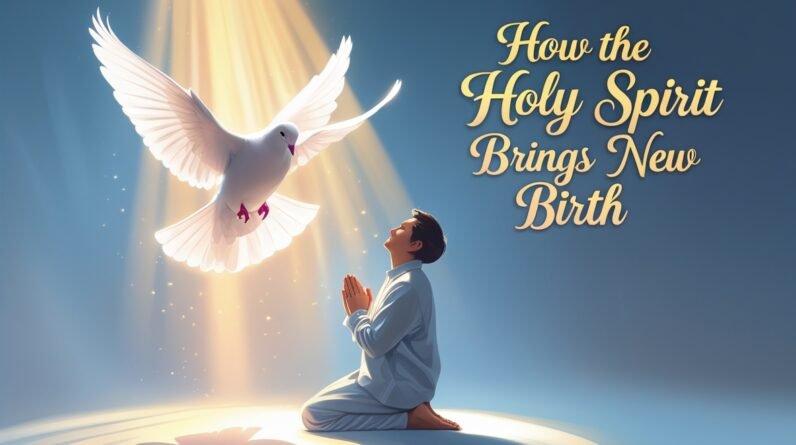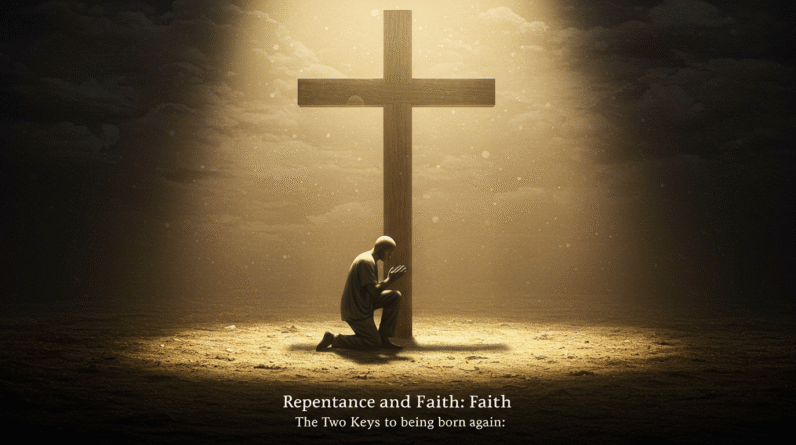From Old Life To New – The Transformation Of Being Born Again
You know that strange feeling when a room you have been used to for years suddenly rearranges itself and you can’t exactly say which corner moved, but you feel as though you are walking through a place that remembers you differently? That is the kind of sensation people sometimes try to describe when they talk about the transformation of being born again. It isn’t a cosmetic shift; it’s not an upgrade of the old furniture with better cushions. It’s more like the whole blueprint has been redrawn: your bearings shift, your scale changes, and the things you once thought central fall away, or at least look different in the light. This article will walk with you through that change — the theological contours, the everyday realities, the stubborn resistances, and the quiet evidence that you and your life are not what they were. You’ll find scripture woven in, because the movement we’re describing is rooted in words people have kept reading for centuries and found shockingly alive, like John 3:3–7 and 2 Corinthians 5:17. If you have come here. After all, something in you asks for newness, or you’re curious about what it looks like to move from old life to new, this is for you.
What “Born Again” Actually Means
When someone says you are “born again,” people often imagine a sudden conversion scene — bright lights, a dramatic decision, a breath like inhaling winter air after being underwater. That can happen, and when it does it is plain and indisputable: one thing ends and another begins. But to say you are born again is to point to a status as much as an event: you have been given a new start in a different economy of identity. Jesus says plainly in John 3:3–7 that you must be born again to see the kingdom of God; the language is biological, intimate, unexpected. It’s not you putting on a better coat; it’s you being given a new coat of skin, less metaphorically than the phrase makes it sound. In your everyday life, that plays out as altered loyalties, different ambitions, and new habits that begin to make sense because they are tethered to a resurrected center.
The Biblical Basis for Radical Change
If you go looking in the New Testament, you’ll find this idea of fundamental change again and again, not as a marginal note but as the core of good news. Paul writes in 2 Corinthians 5:17 that if anyone is in Christ, the old has gone, the new has come. That “old” and “new” are not aesthetic labels; they are lives oriented by different rulers, different hopes. Romans adds a moral and psychological dimension when it says in Romans 12:2 that your mind is to be transformed — a renewal, not just a patch job — so you might discern the will of God. These texts are not abstract philosophy; they are practical, meant to shift how you think about your days, your anxieties, your attempts at meaning. If you want a theology that stays rooted in the street and the kitchen and the workplace, this is it: a transformation that turns habits inside out.
2 Corinthians 5:17 — The Old Has Gone
When you read 2 Corinthians 5:17 you are confronted with a legal-sounding declaration: you are a new creation. That phrase lands like a court transcript: decisive and irreversible. But it also has the tenderness of a midwife’s statement; it is a naming of what already has been done. You might not feel like a new creation all the time; you will still misplace keys and misunderstand friends, and choose poorly. Yet the claim persists beneath those failings, like an anchor under choppy water. The text is offering you identity before performance — you are made new, and then you live from that reality. If you start trying to perform your way into the newness, you’ll exhaust yourself. Instead, stand in the claim and let it reorganize the small decisions you make.
Romans 12:2 — A Renewed Mind
The phrase in Romans 12:2 — “be transformed by the renewing of your mind” — has an almost clinical sense to it, like cognitive therapy described by an ancient poet. But Paul means more than intellect; he is talking about the habitual patterns that undergird your judgments, the background assumptions that tell you what is valuable. Your mind has been trained, like a muscle, to attend to certain things. To be born again involves a painstaking retraining, not by mere willpower but by exposure to new affections and truths practiced in community and solitude. When those affections change, they color perception, which in turn alters choices. The transformation of being born again is therefore not a one-off epiphany alone; it is the slow work of reorientation, exposure, and habituation.
How Salvation Reorients Your Desires
If you pay attention to what it means to be saved in the New Testament, it’s not primarily about checking a box to avoid future punishment, though those concerns are present; it’s more about being given new desires. Paul’s language in Galatians 2:20 — “I have been crucified with Christ and I no longer live, but Christ lives in me” — sounds dramatic because it insists on a new center of gravity: the person who was once driven by a set of appetites now finds those appetites altered, sometimes in ways that surprise them. You will want different things because your heart has been redirected. That doesn’t mean your old cravings evaporate like dew — they hang on, like an old draft in the corner — but the pull of new affections begins to compete, and then sometimes to win. You learn, slowly and sometimes painfully, to prefer what your new identity prefers.
Practical Signs of the New Life
When theologians talk about the marks of a new creation, they often list virtues, habits, and dispositions — love, joy, peace, patience — but these can become platitudes if detached from your life. If you are watching for signs of the transformation of being born again, look at the small, ordinary things: the way you speak to people who irritate you, what you envy, what you pray for, the things that wake you in the night. Real change shows itself in the micro-behaviors of days: you might start to feel guilt differently — less like a shaming whip and more like an invitation to repair — or your anger might be channeled into advocacy for justice rather than simmering resentment. These are the kinds of signs that indicate a structural shift in your life, and they’re often boring and slow, which is exactly why you might miss them if you’re waiting for fireworks.
- You treat your past with new eyes
- Your priorities rearrange without fanfare
- Your language about others softens over time
The Struggle Between Old Habits and New Identity
You won’t get past the old self without confronting it. Being born again doesn’t mean the old self disappears into fairy dust; it means its power is broken over time, often the way a muscle heals after injury — tender, awkward, sometimes bedraggled. Scripture is honest about this: John’s letter says if you claim you have no sin, you deceive yourself, but also offers immediate access to confession and restoration in 1 John 1:8–9. The Christian life is not the eradication of struggle but the recontextualization of failure: it becomes something you bring into light and tend instead of something you hide under a chair until it grows legs. If you are wrestling with patterns you thought gone, that wrestling is not proof that salvation failed; it’s evidence of ongoing work.
The Role of Community and Scripture
You are not intended to navigate this reorientation alone. The New Testament frames the new life as communal — people crucified with Christ together, birthed together into a common life. Acts gives an early picture of believers devoting themselves to apostles’ teaching, fellowship, breaking of bread, and prayer in Acts 2:42. The point isn’t nostalgia for a first-century commune so much as the truth that the formation of your renewed mind happens in conversation, correction, and the shared rituals of a gathered people. Scripture plays its part by being the raw material of that conversation: the texts shape your imagination, provide categories for interpreting experience, and act as a communal memory by which you learn to understand your life differently. If you are trying to orient your desires, reading scripture with others is one of the most practical ways the transformation of being born again takes shape.
Spiritual Practices That Help the Newness Take Root
Transformation is habit-friendly. You’ll find that certain disciplines — prayer, fasting, solitude, worship, the sacraments — are not ends in themselves but means by which the new life is learned. Ephesians tells you to put off the old self and put on the new in Ephesians 4:22–24, which is exactly what habits do: they psychologically prepare your body to receive a different ruling heart. Practices are not magic; if you go through motions without reflection, they will hollow you out. But if you practice with attention, asking why you’re doing it and listening for how it reorients your desires, you will begin to see the small, cumulative adjustments that mark spiritual growth. Think of practices as the scaffolding rather than the finished building.

Not by Your Effort Alone
There is a paradox you will have to learn to live with: you are called to strive, and you are not the primary cause of your own rebirth. Titus is blunt on this point: “He saved us… not by works done by us in righteousness, but according to his own mercy” in Titus 3:5. That doesn’t license passivity or moral drift. Instead, it permits you to fail without despair. The transformation of being born again is a divine-human synergy: God initiates, and you respond; God sustains, and you cooperate. Much of the Christian life is embodied humility — receiving grace and then, in lightness rather than terror, taking up the small tasks of following. If you imagine salvation as a contract you must perform to keep, you’ll either capitulate in exhaustion or live in constant fear. Tilting instead toward trust changes the texture of your effort.
How the Old Self Shows Up Disguised
You will be surprised by how the old self reasserts itself, not in obvious ways but in subtler disguises. It wears piety like armor; it pretends righteousness while clutching the very things it claims to have renounced. You might find yourself moralizing rather than being compassionate, or seeking control in communities where you should be learning to listen. Part of your reorientation is learning to detect these disguises, which means cultivating self-awareness and inviting accountability. The truth is that transformation is often detective work: you track patterns, find repeating loops of behavior, and then bring them into the light of community and scripture to be unmasked. When you do this, you’ll notice change begins to be less theatrical and more surgical — slower but deeper.
The Transformation in Relationships
One of the clearest indices of genuine change is how your relationships rearrange. Being born again will affect how you love your spouse, how you parent, how you argue with your friend, and how you treat strangers. You might become less defensive and more accessible, less anxious about being admired and more interested in the flourishing of others. Paul’s language about the new self being “created to be like God in true righteousness and holiness” implies that transformed people embody a different ethic in relationship, one that loves sacrificially and listens deeply. This doesn’t mean every relationship becomes effortless; fidelity often produces new tensions. But the default metrics shift: you measure success not by how well others validate you but by how faithfully you show up in love.
The Work of Renewal in the Mind
If anything, the battleground of the new life is the mind. Romans urges you to be transformed by the renewing of your mind in Romans 12:2, and that takes deliberate activity. You will have to train attention away from the narratives that once governed you and toward the truths that now undergird you. This might mean memorizing scripture that confronts your lies, practicing gratitude when your impulses trend toward bitterness, and cultivating alternative habits to replace old compulsions. You should expect relapses and false starts; the mind is not reformed in one season. But consistent small acts — choosing a different thought once, then another, and then a third — have a cumulative effect. The transformation of being born again is, in many ways, a retraining of the mind’s default settings.
The Tragedy of Performative Religion
Beware the trap of performativity: religion that looks like measurable output but is spiritually empty. Paul warns against living by appearances and recommends that your inner life match your outward acts. The danger is not that you will do the wrong things; you might be very good at doing “right” things while remaining inwardly untouched. The remedy is not to do fewer things but to let the things you do be informed by a tie you cannot see: humility, repentance, dependence. The transformation of being born again is threatened when you treat religious activity as a currency to be spent on status rather than a means of participating in a new life. If you ever catch yourself measuring spirituality by comparison rather than by transformation, ask how your actions align with the interior reformation you profess.
Hope and the Future Self
Part of the work is imagination. Scripture gives you a future-living framework — the assurance that what begins now has a telos beyond your present comprehension. The new creation is both a present reality and a future promise. When Paul says the new has come in 2 Corinthians 5:17, he anchors you in a present certainty even as he points your hope forward. This is not escapism; it’s a sober hope that grounds daily choices. If you imagine your transformation as a trajectory rather than a point, you can live with patience. You will make decisions not for immediate satisfaction but for the person you are becoming. Hope, in this account, is an ethical practice: it directs present actions toward future reality.
The Ethics of a New Life
What would ethics look like if you lived from the reality of a new birth? It would be less about legal compliance and more about fidelity to the new center. You would begin to ask different questions: How does this action reflect the life of Christ in me? Does this choice cultivate love where there is bitterness? You would take responsibility for what you can change — your speech, your generosity, your attentiveness — and you would accept your limits. The transformation of being born again is, therefore, fundamentally ethical, not in the sense of moralism, but in being a recalibration of how you orient your will. It places love as the governing principle and justice as its necessary expression.
Sorrow, Lament, and the New Life
Conversion does not exempt you from sorrow; in fact, it often deepens it. You’ll notice grief more acutely because you feel the weight of the world and refuse to anesthetize yourself with the small consolations you used to cultivate. Scripture gives space for lament; you see this throughout the Psalms and in Jesus himself. Allowing sorrow without letting it harden into cynicism is a fragile skill — one you learn by naming pain and bringing it into community. Lament is not defeat; it is faithful honesty in the presence of God who hears. In that honesty, the new life is refined. You weep, you remember, and then you hope again, not because grief is optional but because it is transformed into a place where compassion is born.
How to Enter and Tend the New Life
If you are asking practically how to begin or recommit to what it means to be born again, start with small, repeatable practices: read scripture with humility and curiosity, pray with honesty, join a community that will speak truth in love, and confess when you fail so that sin is not allowed to grow hidden. There is also a concrete decision involved: to live as if the claim “you are new” is true. That doesn’t mean pretending to feel new; it means acting from the reality you profess and inviting your feelings to catch up. Jesus’ conversation with Nicodemus in John 3 shows that being born again is both bewildering and simple: it happens by the Spirit’s work. So you prepare and you wait, you act and you receive. The transformation of being born again requires both patient waiting and intentional action.
A Word About Doubt and Faith
Doubt is not the enemy of faith; it’s often the doorway into a more honest faith. People who cannot entertain doubt are usually people who have never had to reckon with questions that matter. The New Testament models a faith that engages questions, doubts, and wrestles with uncertainty. If you find your faith intermittent, that is not necessarily a sign of failure; it may point to an invitation to deeper understanding, to a community willing to stay with you in your questions, and to scripture that can hold them. Often, doubt leads you back to the practice of trust in a less naive but more durable form.

Final Reflection: Living with the Tension
To live as one born again is to live with a tension: you are already new, and you are being made new. That tension is not a fault line to be feared but the grammar of Christian maturity. You will vacillate between confidence and humiliation, between moments of clarity and thick fog, and that is precisely the human place where transformation takes root. When you grow impatient with the slowness, remember that most deep things are slow. The oak takes decades to stand where the sapling once knelt; your life might be less spectacular and more ordinary, but that does not make it less real. The transformation of being born again is not polished or always beautiful in real-time; it is workmanlike, faithful, and undramatic, and it accumulates into a life that, in its ordinariness, is quietly different.
Conclusion
You have read a map, and I hope some of it feels familiar. The journey from old life to new is not a theatrical spectacle but a lifetime of small acts and big promises. The scriptures we touched — John 3:3–7, 2 Corinthians 5:17, Romans 12:2, Ephesians 4:22–24, Galatians 2:20, Titus 3:5, and 1 John 1:8–9 — all of them point you toward a life reoriented by mercy, shaped in community, and lived in hopeful patience. If you are paying attention, you’ll notice how the ordinary stuff of your life begins to answer to a different reality, and there, in the hum of ordinary days, the transformation of being born again is made visible. If you want to continue exploring this, stay with practices that cultivate attention, find a faithful community, and read scripture that calls you out of who you were into who you might become.
Explore More
For further reading and encouragement, check out these posts:
👉 7 Bible Verses About Faith in Hard Times
👉 Job’s Faith: What We Can Learn From His Trials
👉 How To Trust God When Everything Falls Apart
👉 Why God Allows Suffering – A Biblical Perspective
👉 Faith Over Fear: How To Stand Strong In Uncertain Seasons
👉 How To Encourage Someone Struggling With Their Faith
👉 5 Prayers for Strength When You’re Feeling Weak

📘 Jesus and the Woman Caught in Adultery – Grace and Mercy Over Judgement
A powerful retelling of John 8:1-11. This book brings to life the depth of forgiveness, mercy, and God’s unwavering love.
👉 Check it now on Amazon
As a ClickBank Affiliate, I earn from qualifying purchases.
Acknowledgment: All Bible verses referenced in this article were accessed via Bible Gateway (or Bible Hub).
“Want to explore more? Check out our latest post on Why Jesus? and discover the life-changing truth of the Gospel!”








